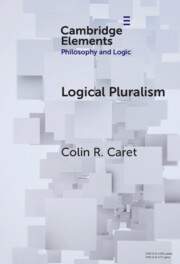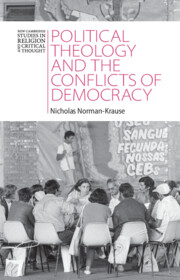Refine search
Actions for selected content:
241 results
1 - Introduction
-
- Book:
- Civil Religion and the Renewal of American Politics
- Published online:
- 09 October 2025
- Print publication:
- 23 October 2025, pp 1-8
-
- Chapter
- Export citation
11 - Conclusion
- from Part III - Contemporary Divisions
-
- Book:
- Civil Religion and the Renewal of American Politics
- Published online:
- 09 October 2025
- Print publication:
- 23 October 2025, pp 223-236
-
- Chapter
- Export citation
9 - Religion’s Role in Social Healing
- from Part III - Contemporary Divisions
-
- Book:
- Civil Religion and the Renewal of American Politics
- Published online:
- 09 October 2025
- Print publication:
- 23 October 2025, pp 181-203
-
- Chapter
- Export citation
Populist Attacks on Academic Freedom: How Populist Leadership Erodes Academic Freedom in Liberal and Electoral Democracies
-
- Journal:
- Perspectives on Politics , First View
- Published online by Cambridge University Press:
- 09 October 2025, pp. 1-17
-
- Article
-
- You have access
- Open access
- HTML
- Export citation
19 - Liturgy and the Religions of the World
- from Part IV - Liturgy and the Life of the Churches
-
-
- Book:
- The Cambridge Companion to Christian Liturgy
- Published online:
- 19 September 2025
- Print publication:
- 09 October 2025, pp 335-352
-
- Chapter
- Export citation

Logical Pluralism
-
- Published online:
- 30 September 2025
- Print publication:
- 23 October 2025
-
- Element
- Export citation
9 - Legitimacy and International Membership
- from Part IV - Construction of Legitimacy in International Law
-
- Book:
- The Law and Politics of International Legitimacy
- Published online:
- 14 July 2025
- Print publication:
- 24 July 2025, pp 161-172
-
- Chapter
- Export citation
A Multifunctional Account of Political Feasibility
-
- Journal:
- Canadian Journal of Philosophy / Volume 54 / Issue 6 / August 2024
- Published online by Cambridge University Press:
- 10 July 2025, pp. 451-465
-
- Article
-
- You have access
- Open access
- HTML
- Export citation
4 - Legislation and Appropriation
-
- Book:
- A Philosopher Looks at Clothes
- Published online:
- 08 May 2025
- Print publication:
- 05 June 2025, pp 79-101
-
- Chapter
- Export citation
Social Entrepreneurship
-
- Journal:
- Social Philosophy and Policy / Volume 42 / Issue 1 / Summer 2025
- Published online by Cambridge University Press:
- 10 July 2025, pp. 1-15
- Print publication:
- Summer 2025
-
- Article
-
- You have access
- Open access
- HTML
- Export citation
Moral Permissibility and Desert in the Therapy-Enhancement Distinction
-
- Journal:
- Journal of Law, Medicine & Ethics / Volume 53 / Issue 2 / Summer 2025
- Published online by Cambridge University Press:
- 30 July 2025, pp. 212-218
- Print publication:
- Summer 2025
-
- Article
-
- You have access
- Open access
- HTML
- Export citation
Differentiation or dialectic: pluralism and contestation in European economic constitutionalism
-
- Journal:
- European Law Open / Volume 4 / Issue 2 / June 2025
- Published online by Cambridge University Press:
- 21 May 2025, pp. 407-413
-
- Article
-
- You have access
- Open access
- HTML
- Export citation
Rethinking democracy in global network governance: norm polysemy, pluralism, and agonistic engagement
-
- Journal:
- International Theory / Volume 17 / Issue 3 / November 2025
- Published online by Cambridge University Press:
- 15 May 2025, pp. 320-349
-
- Article
-
- You have access
- Open access
- HTML
- Export citation
4 - The Pragmatic Approach of International Human Rights Law
- from Title 1 - Theoretical Elements of International Human Rights Law
-
- Book:
- International Human Rights Law
- Published online:
- 10 April 2025
- Print publication:
- 01 May 2025, pp 27-40
-
- Chapter
- Export citation
9 - Recognition
- from Part I - Values
-
-
- Book:
- The Cambridge Handbook of Constitutional Theory
- Published online:
- 27 March 2025
- Print publication:
- 24 April 2025, pp 136-154
-
- Chapter
- Export citation
Nation-States, British Colonial Pluralism, and Nationalist Civil War: A Comparative-Historical Analysis of Zomia
-
- Journal:
- Social Science History / Volume 49 / Issue 3 / Fall 2025
- Published online by Cambridge University Press:
- 10 April 2025, pp. 559-584
- Print publication:
- Fall 2025
-
- Article
-
- You have access
- Open access
- HTML
- Export citation
Introduction
-
- Book:
- Political Theology and the Conflicts of Democracy
- Published online:
- 21 March 2025
- Print publication:
- 03 April 2025, pp 1-34
-
- Chapter
-
- You have access
- HTML
- Export citation

Political Theology and the Conflicts of Democracy
-
- Published online:
- 21 March 2025
- Print publication:
- 03 April 2025
Rethinking Japan's Constitution from the Perspective of the Ainu and Ryūkyū Peoples
-
- Journal:
- Asia-Pacific Journal / Volume 16 / Issue 5 / March 2018
- Published online by Cambridge University Press:
- 14 March 2025, e5
-
- Article
-
- You have access
- Open access
- Export citation
The Constitution, Human Rights and Pluralism in Japan: Alternative Visions of Constitutions Past and Future
-
- Journal:
- Asia-Pacific Journal / Volume 16 / Issue 5 / March 2018
- Published online by Cambridge University Press:
- 14 March 2025, e1
-
- Article
-
- You have access
- Open access
- Export citation
